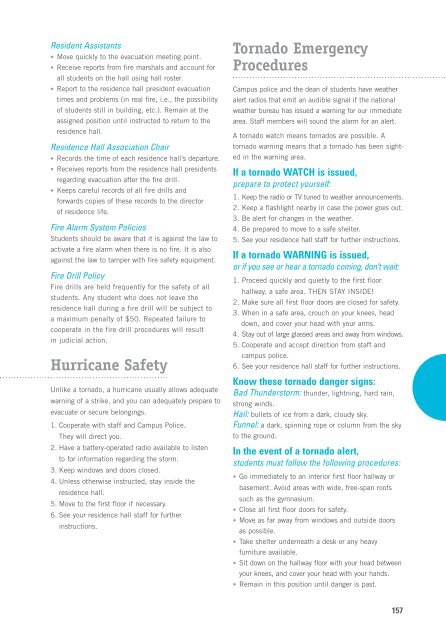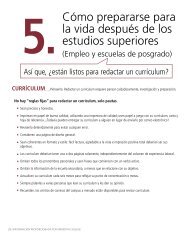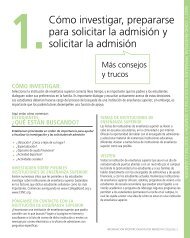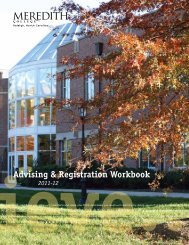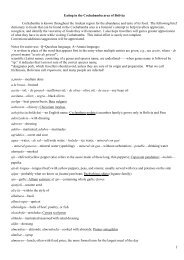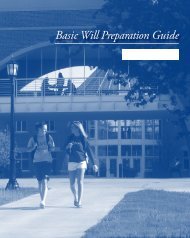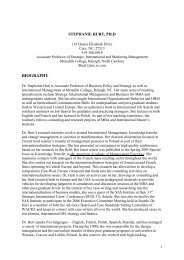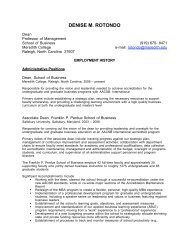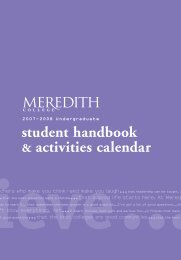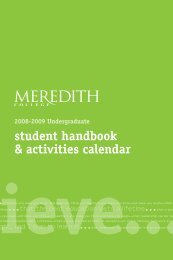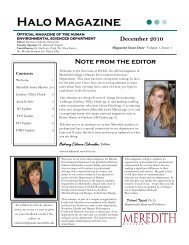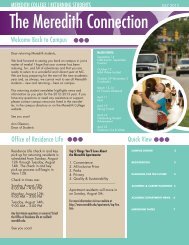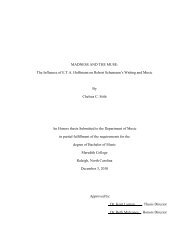student resources - Meredith College
student resources - Meredith College
student resources - Meredith College
Create successful ePaper yourself
Turn your PDF publications into a flip-book with our unique Google optimized e-Paper software.
Resident Assistants<br />
• Move quickly to the evacuation meeting point.<br />
• Receive reports from fire marshals and account for<br />
all <strong>student</strong>s on the hall using hall roster.<br />
• Report to the residence hall president evacuation<br />
times and problems (in real fire, i.e., the possibility<br />
of <strong>student</strong>s still in building, etc.). Remain at the<br />
assigned position until instructed to return to the<br />
residence hall.<br />
Residence Hall Association Chair<br />
• Records the time of each residence hall’s departure.<br />
• Receives reports from the residence hall presidents<br />
regarding evacuation after the fire drill.<br />
• Keeps careful records of all fire drills and<br />
forwards copies of these records to the director<br />
of residence life.<br />
Fire Alarm System Policies<br />
Students should be aware that it is against the law to<br />
activate a fire alarm when there is no fire. It is also<br />
against the law to tamper with fire safety equipment.<br />
Fire Drill Policy<br />
Fire drills are held frequently for the safety of all<br />
<strong>student</strong>s. Any <strong>student</strong> who does not leave the<br />
residence hall during a fire drill will be subject to<br />
a maximum penalty of $50. Repeated failure to<br />
cooperate in the fire drill procedures will result<br />
in judicial action.<br />
Hurricane Safety<br />
Unlike a tornado, a hurricane usually allows adequate<br />
warning of a strike, and you can adequately prepare to<br />
evacuate or secure belongings.<br />
1. Cooperate with staff and Campus Police.<br />
They will direct you.<br />
2. Have a battery-operated radio available to listen<br />
to for information regarding the storm.<br />
3. Keep windows and doors closed.<br />
4. Unless otherwise instructed, stay inside the<br />
residence hall.<br />
5. Move to the first floor if necessary.<br />
6. See your residence hall staff for further<br />
instructions.<br />
Tornado Emergency<br />
Procedures<br />
Campus police and the dean of <strong>student</strong>s have weather<br />
alert radios that emit an audible signal if the national<br />
weather bureau has issued a warning for our immediate<br />
area. Staff members will sound the alarm for an alert.<br />
A tornado watch means tornados are possible. A<br />
tornado warning means that a tornado has been sighted<br />
in the warning area.<br />
If a tornado WATCH is issued,<br />
prepare to protect yourself:<br />
1. Keep the radio or TV tuned to weather announcements.<br />
2. Keep a flashlight nearby in case the power goes out.<br />
3. Be alert for changes in the weather.<br />
4. Be prepared to move to a safe shelter.<br />
5. See your residence hall staff for further instructions.<br />
If a tornado WARNING is issued,<br />
or if you see or hear a tornado coming, don’t wait:<br />
1. Proceed quickly and quietly to the first floor<br />
hallway, a safe area. THEN STAY INSIDE!<br />
2. Make sure all first floor doors are closed for safety.<br />
3. When in a safe area, crouch on your knees, head<br />
down, and cover your head with your arms.<br />
4. Stay out of large glassed areas and away from windows.<br />
5. Cooperate and accept direction from staff and<br />
campus police.<br />
6. See your residence hall staff for further instructions.<br />
Know these tornado danger signs:<br />
Bad Thunderstorm: thunder, lightning, hard rain,<br />
strong winds.<br />
Hail: bullets of ice from a dark, cloudy sky.<br />
Funnel: a dark, spinning rope or column from the sky<br />
to the ground.<br />
In the event of a tornado alert,<br />
<strong>student</strong>s must follow the following procedures:<br />
• Go immediately to an interior first floor hallway or<br />
basement. Avoid areas with wide, free-span roofs<br />
such as the gymnasium.<br />
• Close all first floor doors for safety.<br />
• Move as far away from windows and outside doors<br />
as possible.<br />
• Take shelter underneath a desk or any heavy<br />
furniture available.<br />
• Sit down on the hallway floor with your head between<br />
your knees, and cover your head with your hands.<br />
• Remain in this position until danger is past.<br />
157


